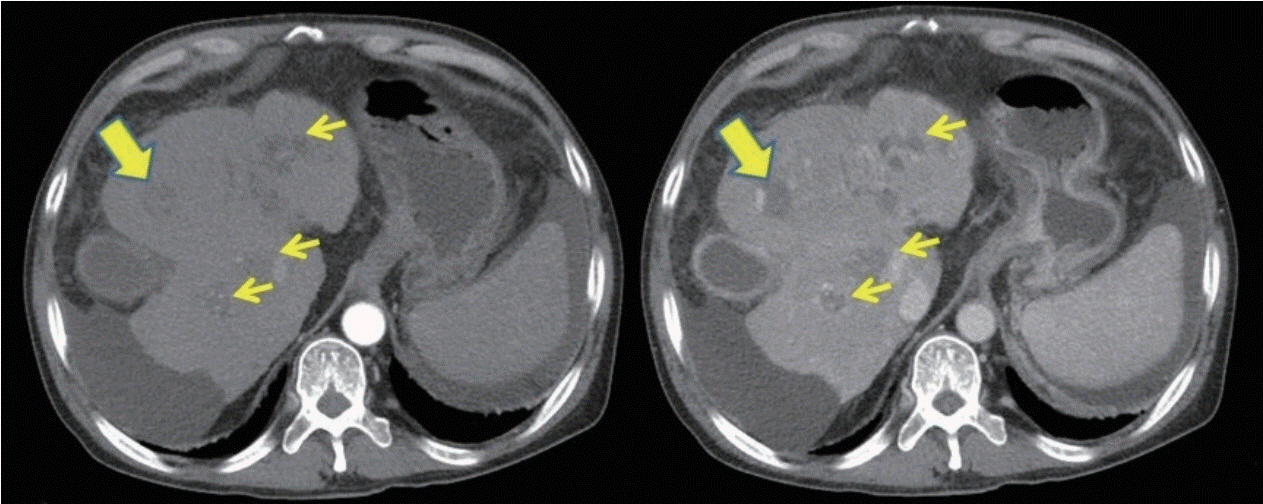J Liver Cancer.
2019 Mar;19(1):55-58. 10.17998/jlc.19.1.55.
Hepatic Failure Due to Hepatitis E Virus Infection in a Patient with Necrotic Hepatocellular Carcinoma
- Affiliations
-
- 1Division of Gastroenterology, Department of Internal Medicine, Eulji University Hospital, Eulji University College of Medicine, Daejeon, Korea. elimier@gmail.com
- KMID: 2448277
- DOI: http://doi.org/10.17998/jlc.19.1.55
Abstract
- In patients with hepatocellular carcinoma (HCC) or liver cirrhosis (LC) accompanied by hepatitis E virus (HEV) infection, hepatic failure often leads to debility. Here, we report about a 63-year-old man with alcoholic LC who was referred to our hospital with jaundice and abdominal distension 10 days earlier. Abdominal computed tomography showed necrotic HCC accompanied by left lobe shrinkage without tumor progression. Laboratory and imaging findings revealed no acute infection focus. The patient reported no herbal medicine or alcohol consumption, and there was no evidence of acute viral hepatitis. One month later, HEV immunoglobulin M positivity was confirmed, and deterioration of liver function due to HEV infection was suspected. The patient often ate raw oysters and sashimi, as well as boar meat, which is a well-known risk food for HEV infection. His umbilical hernia deteriorated due to tense ascites and infection by skin abrasion. The patient progressed to hepatorenal syndrome and eventually died. Liver function preservation is important when treating HCC patients. Therefore, clinicians should pay more attention to the prevention of HEV and others causes of direct liver injury.
MeSH Terms
-
Alcohol Drinking
Alcoholics
Ascites
Carcinoma, Hepatocellular*
Hepatitis E virus*
Hepatitis E*
Hepatitis*
Hepatorenal Syndrome
Herbal Medicine
Hernia, Umbilical
Humans
Immunoglobulin M
Jaundice
Liver
Liver Cirrhosis
Liver Failure*
Meat
Middle Aged
Ostreidae
Skin
Transcutaneous Electric Nerve Stimulation
Immunoglobulin M
Figure
Reference
-
1. Jeong SH. Current status of hepatitis E virus infection in Korea. Gut Liver. 2011; 5:427–431.2. Blondon H, Fritsch L, Cherqui D. Two cases of spontaneous regression of multicentric hepatocellular carcinoma after intraperitoneal rupture: possible role of immune mechanisms. Eur J Gastroenterol Hepatol. 2004; 16:1355–1359.3. Cole WH. Efforts to explain spontaneous regression of cancer. J Surg Oncol. 1981; 17:201–209.4. Randolph AC, Tharalson EM, Gilani N. Spontaneous regression of hepatocellular carcinoma is possible and might have implications for future therapies. Eur J Gastroenterol Hepatol. 2008; 20:804–809.5. Park WJ, Park BJ, Ahn HS, Lee JB, Park SY, Song CS, et al. Hepatitis E virus as an emerging zoonotic pathogen. J Vet Sci. 2016; 17:1–11.6. Song YJ, Park WJ, Park BJ, Lee JB, Park SY, Song CS, et al. Hepatitis E virus infections in humans and animals. Clin Exp Vaccine Res. 2014; 3:29–36.7. Shin HK, Yoon JD, Yoo JC, Kim MB, Kim KS, Suh SD, et al. Prevalence of hepatitis E virus antibody on residents of seashore town in Korea. J Korean Soc Virol. 1993; 23:215–222.8. Lim JW, Park CS, Ahn JM, Yu MH, Kim TS, Lim YS, et al. Nine cases of sporadic acute hepatitis E in Korea. Korean J Hepatol. 2006; 12:230–236.9. Barragué H, Condat B, Petitdidier N, Champagne E, Renou C, Izopet J, et al. Chronic hepatitis E virus infection in a cirrhotic patient. Medicine. 2016; 96:e7915.10. Moon S, Han JH, Bae GR, Cho E, Kim B. Hepatitis A in Korea from 2011 to 2013: current epidemiologic status and regional distribution. J Korean Med Sci. 2016; 31:67–72.11. Choi JS, Ko JW, Park S. Factors associated with hepatitis A preventative behaviors among university students. Korean J Adult Nurs. 2015; 27:127–134.
- Full Text Links
- Actions
-
Cited
- CITED
-
- Close
- Share
- Similar articles
-
- A case of primary hepatocellular carcinoma following vertical transmission of hepatitis B virus in a child
- Management of viral hepatitis in patients with hepatocellular carcinoma
- A case of fulminant hepatic failure complicating hepatitis A virus superinfection in a hepatitis B virus carrier
- Overview of Hepatitis B Virus associated with Fulminant Hepatic Failure in Korea
- Prevention of Viral Hepatitis and Vaccination


